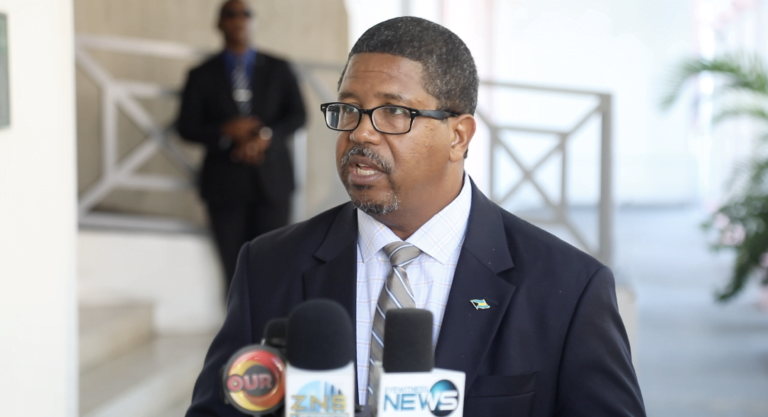Turnquest says developed nations must share responsibility for climate crisis
NASSAU, BAHAMAS – The government is working to facilitate the return of scores of Bahamians who remain “marooned” abroad more than a month since passage of deadly Hurricane Dorian, according to Deputy Prime Minister Peter Turnquest.
Turnquest told regional heads of the International Monetary Fund urgent action was required to address climate refugees, who he said will not wait for permission to migrate for survival.
He underscored hundreds of storm victims were evacuated to the United States in Dorian’s wake as he addressed an annual breakfast meeting with Governors and Alternate Governors of the Caribbean Region of the fund.
Customs and Border Protection (CBP) processed more than 4,000 evacuees from the Bahamas following Hurricane Dorian.
However, a CBP public affairs officer told Eyewitness News Online the majority were US Citizens living in The Bahamas.
The CBP official explained any special consideration for Bahamian migrants would be on a case by case basis, and pointed to a notice posted last month outlining requirements for emergency visa appointments.
Turnquest said: “Domestically, as we move to implement policies like mandatory evacuations, particularly as an archipelago, we have to address the added fiscal pressures that internal migration puts on the central government, our urban capital, and other rural island communities with limited infrastructure.
“Internationally, there should be no equivocating on the matter of climate refugees. Climate refugees will not wait for the international community to define them as such. They will and are moving based on the need to survive.
He continued: “After Hurricane Dorian, The Bahamas had hundreds of affected individuals evacuate to the United States. Even as we speak, we are working to facilitate the return of affected Bahamians marooned abroad.”
“Considerations for facilitating climate refugees must now make its way onto the front page of climate risk considerations as these realities become more and more relevant.”
Speaking on the theme, “Exploring Options for Building More Resilient Caribbean Economies”, Turnquest maintained developed nations must share the responsibility for the rehabilitation of economies and nations disproportionately impacted by the climate crisis.
He underscored “rigid methodology” that exclusively looks at country’s GDP per capita for determining concessional finance.
Turnquest said this was a “poor proxy” for determining the needs of countries, particularly those with heightened vulnerability to exogenous shocks such as back-to-back catastrophic natural disasters.
“The Bahamas has put in place a Disaster Risk Framework for Better Fiscal Management that includes different types and sources of financing, including contingent credit lines, parametric insurance, budgetary savings line items, and restrictions by law on allocation of windfalls from dormant accounts to a disaster fund; however, for all of us, concessionary financing is an essential component, particularly to avoid increases in debt that are unsustainable,” he said.
Turnquest noted 20 percent of the Bahamian economy has “virtually gone offline” due to Hurricane Dorian.
“With each passing storm, whether it is at the doorstep of Dominica, the British Virgin Islands or the Islands of The Bahamas, more and more of our vulnerabilities as Small Island Developing States (SIDS) are exposed: not only in terms of our economic resilience and national response, but also at the individual level, for families wondering about their physical safety, and their economic security should they be in the path of the next storm,” he said.
“The power of Dorian reduced parts of Great Abaco and the Abaco Cays, our third largest economic centre, to absolute rubble. After the storm, the most direct way to describe what the landscape in some areas is like a public landfill: A wasteland of building and vegetative debris with mangled steel buildings, cars, boats and 40-foot containers thrown around like toys. Grand Bahama, our second largest economic centre, and the island I call home, had entire communities underwater and completely hollowed out.
“Collectively, 20 percent of our economy has virtually gone off line for the time being.”
Turnquest said The Bahamas and the Bahamian people are expected to bear the burden of a climate crisis “we are not responsible for” in the wake of the deadly storm.
He continued: “Our suffering is not only personal, it is representative of the vulnerabilities faced by Caribbean nations and SIDS on the whole; it is representative of a new reality that the global community must contend with and more effectively respond to.
“We are independent nations. We are resilient people, but the promise of multilateralism is that we don’t walk alone, and it is time for our international partners, particularly multilateral development banks, to make changes and implement practical solutions now.”


